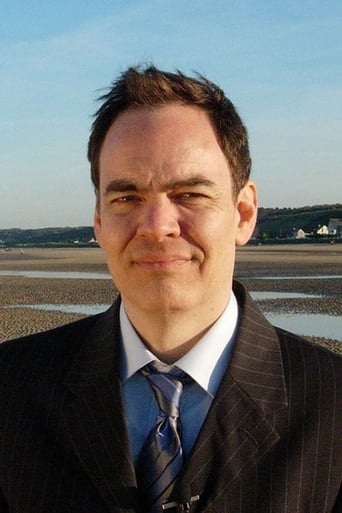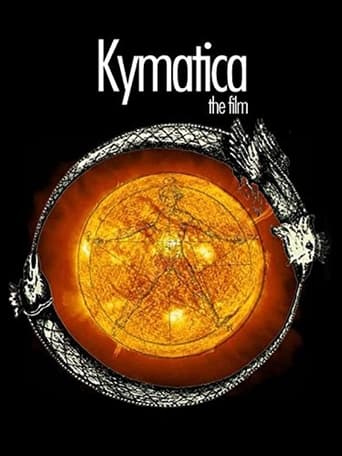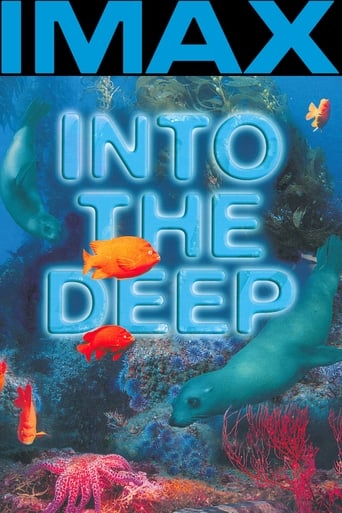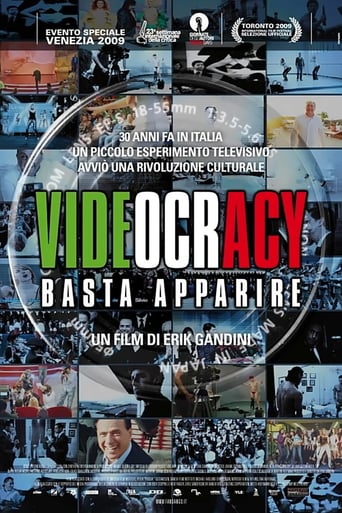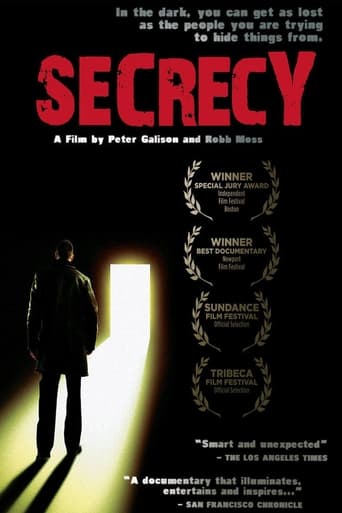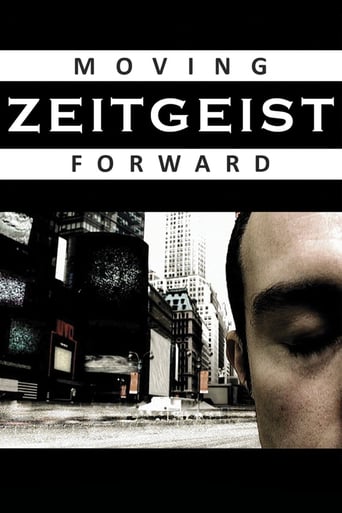
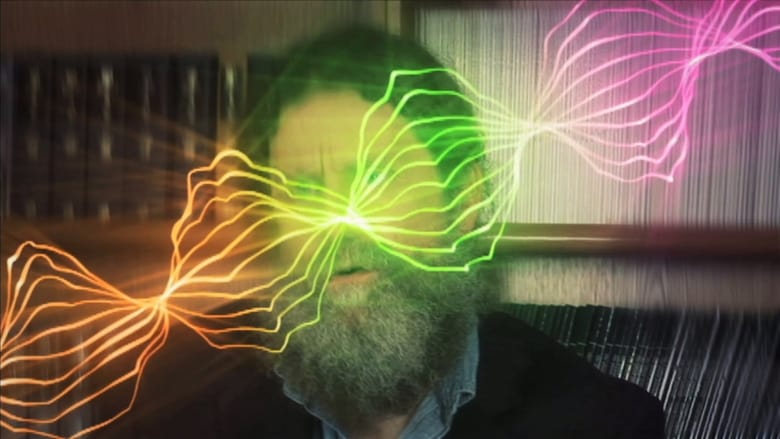
Zeitgeist: Moving Forward (2011)
A presentation of a case for a needed transition out of the current socioeconomic monetary paradigm which governs the entire world society. This subject matter will transcend the issues of cultural relativism and traditional ideology and move to relate the core, empirical 'life ground' attributes of human and social survival, extrapolating those immutable natural laws into a new sustainable social paradigm called a 'Resource-Based Economy'.
Watch Trailer
Cast


Similar titles
Reviews
So, so sorry, I can't tell you if I agree with the premise of this movie or not. I couldn't, I just could not continue, so I don't know if telling you that if the movie is pathetic is a spoiler or not, maybe that was the point.You can prove quite simply that negative equals positive or that up is down or whatever contradicting premise you wish, simple or complex. You can just bend it or you can turn 90 degrees or 180 degrees or you can go back to where you started. Rhetoric is rhetoric. I am afraid I could not bare to stick with this movie long enough to see what the double talk concluded. It was too much of an insult to even low intelligence.It seemed an attempt to say, If I generally agree with most of your points? Am I supposed to agree with your premise? or your conclusion? Don't think, just agree. I've been down that road far far to many times in my life. I don't care if I agree with them or I disagree with them, this is not to me a means of intelligent conversation, or even a one sided conversation.I remember when I was still very very young, I didn't care anyway, but John Birchers use to do this. I still don't know what they were proving, but it was so simple I had far more fun turning their logic around against them.Well watch this if you are part of a flock of sheep, if you must.
First of all, for the low attention span audience (which is sadly high), here is the SOS (summary of summary): "We are sinking, not thinking; we can think and do better." How concise and clear is that? But really, let me elaborate, hopefully without boring you.The final and critical chapter in the Zeitgeist series, Zeitgeist: Moving Forward gets right down to the essentials. We are living in a system that does not help us: the monetary (and market) system. Peter Joseph was a stock broker (for 6 years) but left the financial sector realizing that it created no real value to society.This system of "free" market, competition and socioeconomic divide is the biggest problem. Before looking at the ideologies between capitalism or socialism, democracy or dictatorship, liberal or conservative, etc. we need to realize how this underlying reality of our world is affecting us now and in the near future in diverse and very fundamental ways. The rest is in fact almost irrelevant. As we changed from the barter system to the money system, we are on the verge of recognizing we need a newer system all together. Planned obsolescence of products, the continuous creation of debt and the exploitation of natural and human resources in a never-ending spiral of money-hungry economy is duplicity in drudgery. Inefficiency, waste and sickness are intrinsic part of the system. The proposed solution is a radical change to a resource-based economy and the use of science and technical advances, including automation, and a continuous survey of local and global resource with distribution and sharing without the current concept of ownership.To the detractors of the proposed system, there are many answers, based on scientific findings. For the constantly claimed unstable social elements potential problems, the idea of "victims of culture" is well explained and a culture shift, education and action without judgement are keys to the potent paradigm shift. When people have their needs met, the adaptation becomes easier.The film feature many interviews, some narration and a few animations and scenes. The longest film of the series (161 mins) is well written and edited even if the subject(s) actually can be much more explored in further details. After a musically & visually engaging intro and anecdote by 94-year-old Jacque Fresco, the movie starts rather slowly. The Part I & II (Human Nature & Social Pathology) discuss some concepts that will build the overall premise, but with limited intensity in the flow of ideas. The nature vs. nurture debate is slightly debunked and the idea of a strong environment component along with clear cultural conditioning in ultimately shaping human behaviour is put forward in Part I. We then see the details of the philosophy of ownership (theory of property) by John Locke in the late 17th century and the machination of the market system as the first part of Part II. Joseph then revisits the ideas of the monetary system we know and its failings which were discussed differently in the first two films.The crux of the film tries to fulfil its title of "Moving Forward" and proposes to first reset the planet and its people and try to build a better system from scratch with at its base, better goals, more appropriate ideas and superior tools. Project Earth (Part III) advances many of the ideas of Jacque Fresco's Project Venus and shows the use of computers and automation as the next logical step, even to create homes and reduce human labour construction work and related accidents. Same goes for car accident deaths and pollution, among many proposed benefits of the plan in progress. The good thing about science is that it needs to be tested and that its ideas are always open to better ideas that represent and acts upon reality better, we are told. Maybe that point could have been repeated, as I find it to be quintessential to the approach of this film and perhaps to humankind's advancement as a whole. "Part IV: Rise" is a peaceful, but determined call to action and also a call for creative people to get involved in thinking now about how we can better our derelict and detrimental ways or living. For someone who wrote a novel, "Paradise on Earth?", about a utopian society without money, while being 19 to 22-year-old, I can definitely relate and I am elated at the created sense of urgency, with thought-out open-minded, but basically feasible and achievable, aspirations for real world awakening in the midst of this mind-numbing masked mayhem we meander and marinate in, militantly or unconsciously.In a world where empathy and trust are often empty and lost, the Zeitgeist trilogy (and especially part 2 & 3) may well be the best thing since CouchSurfing...
Watched it few hours ago. followed all three parts of it. had a good bunch of great thought provoking stuffs, blended along with some severely argumentative illusions that i might not adopt. a ton of questions floating in my mind trying to reveal feasible answers coping with their arguments, remained inconclusive still. i remember i emailed a bunch of relevant and serious questions regarding earlier parts long time ago, still impounded with no logical answers till date. i hate current imperialistic monetary-market system as they do; still some part of me telling me to like the zeitgeist ideas and the other logically arguing not to. just few of my large chunk of new questions might be(some might say i am tripping...lol!): 1. the current imperialistic monetary-market system owners have history of demolishing every entity that might stand in their way. if some of you are threat enough to them, why they have not taken any strong action on or eliminated zeitgeist (or julian assange, or alex jones or few such more) yet?!?? with due respect, sorry to say that you guys haven't showed much about that the world doesn't already know. are you just alternative strategic deployed players of their potential single New World Order system?!? are they strategically implanting relevant key players in both sides of the game to ensure a win?! 2. how different are, 'a world with many countries' and 'a world with many cities'?! mirror reflection as it seems. 3. 'global resource management system'...who would be in control of that management system and what would be the management hierarchy?! we all know, all decisional opinions can not be singular, so someone has to decide; who would that be?! we also know, money has no intrinsic value of itself; don't you think the singular power and control on 'global resource management system' would have some significant intrinsic value?! how to decide who to lead when?! the 'democracy' again...:)?! wouldn't that be another scam of politics?! 4. who gets to eat caviar or only potatoes...hang luxury art piece or mere calendar on wall...watch entertaining movies on 100inch plasma TV or just able to watch boring news on 20inch crt TV...sail to world tour or only can view sunset from rooftop...who decides about the quality and quantity of final products each can consume?! inequality doesn't depend on only as monetary disparity, but also on consumption opportunities. 5. what if there is large permanent migrations between these modern so called 'cities' resulting in overcrowding and underpopulation among different cities!? how to decide who lives where!? 6. i could not find or rely on a number of statistical facts it's given. moreover, it talked about if a hypothetical similar new earth found...which is not available realistically; rather in this current world, enough damage is already done to create a significant natural imbalance among various regions. how to regain dynamic equilibrium in this already unbalanced natural world as 'Nature is a dictatorship' itself!?there could be many more to clarify...but no offence...i have been a major encouraging initiator for any positive change as always among my peers and students. however, i believe in the saying, "hope for the best, but plan for the worst." :) :)
The movie was very strong in naming and explaining what is wrong with the world today. Namely the economy, monetary politics, usage of capital and debt creation, production/advertising/goods distribution ways and related consumer behavior. It also had many points on how our behavior impacts environment - and the makers also skillfully put stress on our planet being finite (having finite volume of resources) we can use without the regard on sustainability and/or renewal. It was alright. The most sounding point was that shopping for, gathering and consuming (=trashing) goods does not make us happy. It doesn't. Paying up debts doesn't either. But then, they've unfortunately came up with "solutions". I would have so many logical and practical questions and remarks to that as a proof it's nothing but an utopia. There's no way people could be motivated or even forced to create something like that and remain compliant with these rules. It would never work - not even in theory. Shortly after, the whole "solution" started to evolve about the designed life project called The Venus project - a vision of Jacque Fresco. It's a huge techno-communist and an utopian idea about making a high-tech tech robots and systems serve the people of this self-sufficient society. Everything would be taken care of by these machines and they would eliminate the need for standard human jobs. Even garbage and mail would be distributed by robots running around in tubes. And hold your breath : no money would exist in this society. In reality a market would start to exist the minute after this came in effect and people would trade the "free" things they get.People will always want something from each other and very likely they'll have to pay by something that represents value. The sentence about money free system would make any theory ridiculous. It said people that do not work for the money (and are under stress of their lack+need of) would not just sit around but they'd do things for joy. OK, I get that although I'm pretty sure they would rather choose fun activities than doing anything useful and a disaster would be inevitable. And wait, who would operate or service the robots? Slaves? Who would study long years to be able to program, create, build and repair all those super devices, watch over resources distribution, double check if machine are working and not making wrong choices? Who would study for and work jobs that could not be replaced technically like a doctor for example? This society was said to have 95% less crime than normal society. Sounds great but I'd like to know if people would want to risk their life as cops if they could do something safer as far as everybody could do what they wanted. Oh wait, nobody said that. Not once in the whole movie. That's probably because even in a very wild dream this could only exist if people were enslaved to fulfill "the purpose of common" good. (And they might be dumb enough to welcome that). We've had these "perfect" iron-fist "righteous" systems so many times here in history. And though we as people are fairly dumb we must have learned already there's absolutely no good in an ideological common "good". As sick as it sounds people need to be simply motivated egoistically or their will disobey and revolt. This world has gone wrong in so many ways and we really need to pay attention especially to global-scale problems and figure out how to fix them but I tell you one thing - this is not the way. By far. What has to be granted though is, they present their ideas openly and not try to hide or mix their meaning. This movie reminded me what I already knew (and extended of some interesting stats) that earth and humanity is sick and something has to be done. But I am very positive, this movie doesn't offer ideas that could serve as an effective cure and everyone who understand the reality should agree. Make sure to notice the passage when the title expresses worries about possible insults and labels like communism and fascism. The movie gave a lot of reasons for people to address these labels towards these ideas. The zeitgeist engineers then respond to this hypothetical insult and explain why would it be wrong to call them Marxists, communist or fascist. And they are right. The correct world for this non-sense would be (techno)utopianism.And they were brisk enough to even include that one!




